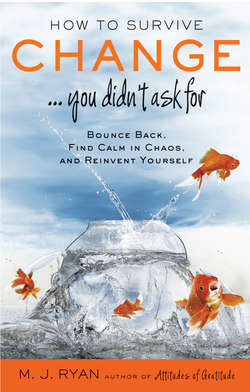Читать книгу How to Survive Change . . . You Didn't Ask for - M. J. Ryan - Страница 19
На сайте Литреса книга снята с продажи.
The Truth Will Set You Free (Or at Least into Motion)
ОглавлениеDenial ain't a river in Egypt.
—Anonymous
Sandra was slowly sinking into debt each month. Her graphics business was just not making enough money. Periodically she'd get her eighty-three-year-old mother to give her a loan, which she'd never pay back. When family members would ask about it, she'd say, “I'm a fifty-nine-year-old woman. I'm doing all I can. There's nothing else I can do.” One day, her sister and daughter decided to intervene. They sat her down and said, “You have a problem. You can't go on like this. We're here to help.” First they went over her budget with her. Sandra hadn't looked at the figures in more than a year. “We helped her see the actual amount of money she was losing each month and brainstorm ideas of how to make it up,” explained her sister. “When she said, ‘There's nothing else I can do,’ we went on Craigslist with her to see what jobs were available and what the requirements were. She realized that she did have the ability to do many jobs listed there. She's since gone out and gotten a part-time job that enables her to keep her business running and not go in the hole.”
Denial can take many forms. It can be a refusal to admit there's a problem, or an inability to look squarely at the situation, or to take action on it. Or it can be certainty that attempts to make the situation better are futile: “Why try? It won't make a difference.” Deep down, we're afraid the problem is too big or hairy to cope with. So we ignore that it's there. If we know it will mean giving up something we're strongly attached to or even addicted to, we may pretend it's not going on so we won't have to do the painful work of change.
As people who love those with addictions know, you can't make someone come out of denial. How and when a person decides to confront reality and change remain a mystery. Interventions often work, however, because they can wake the person up out of the trance she's been in—she may see that the situation is serious enough that you've gathered together to talk about it. And she may realize she doesn't have to face the change alone—you're going to help.
I'm not suggesting that if you love someone with an addiction that you stage an intervention on your own. That takes real experience and expertise.
But if you're concerned that someone you're close to needs to accept the reality of a situation and just needs a little push to get going, sometimes straight talk, coupled with help in getting them started, can work. An Internet entrepreneur told me the other day of a very useful conversation he had with his accountant. The accountant said, “After looking at your books, I need to tell you it's down to your business or your house. If you don't let the one go, you will lose the other.” “It was just what I needed in order to stop hoping for a miracle and go out and look for a job,” said Bob.
A friend had been telling me for months she needed to look at her finances because she knew she was spending too much. I offered to sit with her as she faced the music. The numbers showed she was spending $2,000 more a month than she made. Like so many of us, she'd been living off that lovely piggy bank—the equity in her house—which suddenly dried up. Looking at the actual number was the wake-up call she needed to get a serious budget in place and a plan to pay off her huge second mortgage.
